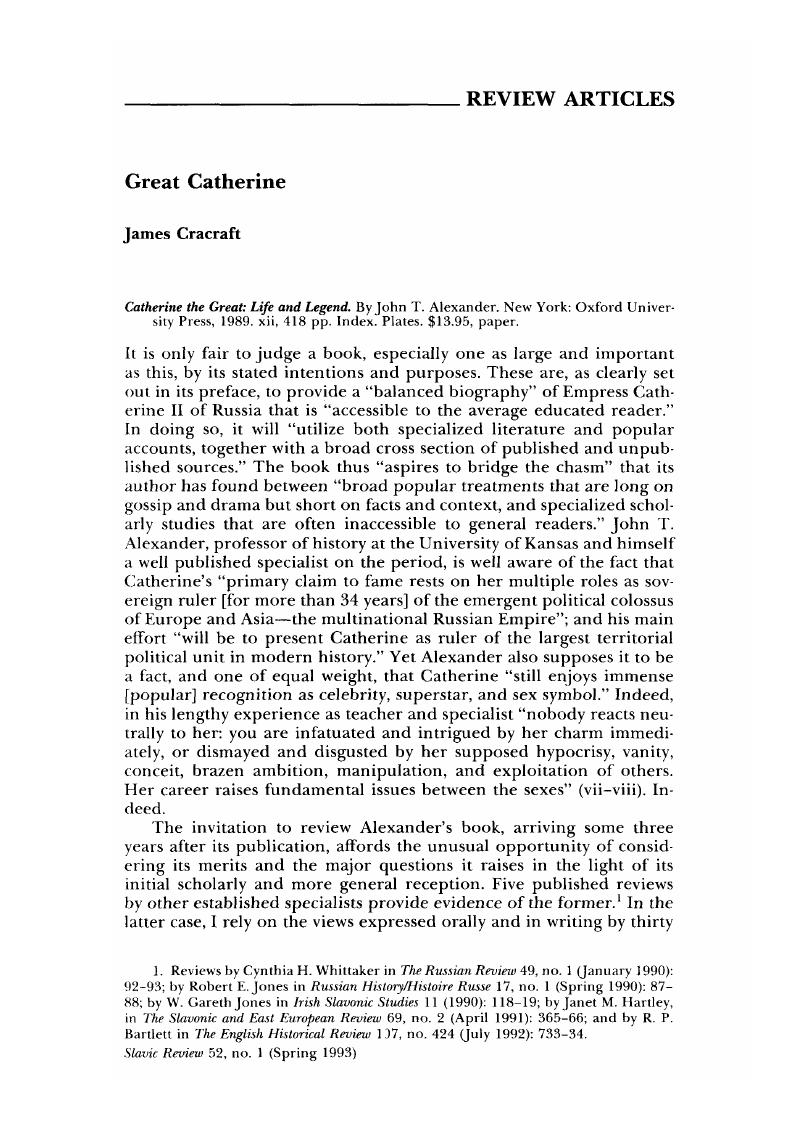Article contents
Great Catherine
Published online by Cambridge University Press: 27 January 2017
Abstract

- Type
- Review Articles
- Information
- Copyright
- Copyright © Association for Slavic, East European, and Eurasian Studies. 1993
References
1. Reviews by Cynthia H. Whittaker in The Russian Review 49, no. 1 (January 1990): 92–93; by Robert E.Jones in Russian History/Histoire Russe 17, no. 1 (Spring 1990): 87–88; by W. Gareth Jones in Irish Slavonic Studies 11 (1990): 118–19; by Janet M. Hartley, in The Slavonic and East European Review 69, no. 2 (April 1991): 365–66; and by R. P. Bartlett in The English Historical Review 137, no. 424 (July 1992): 733–34.
2. Alexander, John T., Bubonic Plague in Early Modern Russia : Public Health and Urban Disaster (Baltimore : Johns Hopkins University Press, 1980 Google Scholar.
3. New Haven : Yale University Press, 1990. It might be noted, for non-specialists, that Madariaga, professor emerita at the University of London, is regarded as the preeminent living historian of Catherine's Russia: “the recognized senior specialist in this field,” as Alexander writes, acknowledging “the benefit of her immense knowledge and insight in an extensive critique” of a draft of his book (xii). See also Bartlett, Roger and Hartley, Janet, eds., Russia in the Age of the Enlightenment : Essays for Isabel de Madariaga (New York : St. Martin's Press, 1990)CrossRefGoogle Scholar.
4. Susan E. Oldenburg, “Comparison and Criticism of Alexander and Madariaga on Catherine the Great,” paper submitted in History 435, UIC, fall semester 1991. Quoted with permission.
5. This passage, in the original, continues: “Or so a ribald poet recorded at the time [no specific reference]. In sexual terms, Grigorii Orlov epitomized [to whom?] the masterful male in the same way that Catherine personified [for whom?] the insatiable, penis-conquering female. These depictions [found where?] are largely myths, of course, but there is some factual basis to them [found where?!]” (56). Also, a little later : “Orlov's political potential, in Catherine's eyes, almost equaled his sexual prowess” (56). And later : “What if Catherine should decide to marry the handsome stud?” (73–74).
6. Maria Mooney, “Review Essay,” History 237, UIC, fall semester 1992. Quoted with permission.
7. Dolores M. Davison, “Sexism and Scholarship : A Review of John T. Alexander's Catherine the Great : Life and Legend,” History 531, UIC, fall semester 1992. Quoted with permission.
8. The same point may be made regarding Alexander's frequent references to Catherine's skill in riding horses, a favorite exercise with important political dimensions (see 22, 32, 40, 65, etc.).
9. Madariaga, Isabel de, Russia in the Age of Catherine the Great (New Haven : Yale University Press, 1981 Google Scholar : see especially chap. 22, “Favoritism,” totaling less than 16 of nearly 600 pages of text.
10. And in her article, “The Foundation of the Russian Educational System by Catherine II,” The Slavonic and East European Review 57, no. 3 (July 1979): 369–95; this work is not cited by Alexander.
11. For an introduction to this neglected subject, see A McConnell, llen, “Catherine the Great and the Fine Arts,” in Mendelsohn, Ezra and Shatz, Marshall S., eds., Imperial Russia, 1700–1917 : State, Society, Opposition. Essays in Honor of Marc Raeff (DeKalb : Northern Illinois University Press, 1988), 37–57 Google Scholar. This work is cited neither by Alexander nor by Madariaga.
12. Cf. official statements in UIC News (21 October 1992): 7; and The University of Chicago Record (10 December 1992): 9.
13. Meehan-Waters, Cf. Brenda, “Catherine the Great and the Problem of Female Rule,” The Russian Review 34, no. 3 (July 1975): 293–307 CrossRefGoogle Scholar. This article is cited neither by Alexander nor by Madariaga.
14. And the problem is obviously not the usual one, in feminist or women's history, of the hidden, ignored or subjected being. On the other hand, the progress of women's or feminist history, conceived and executed primarily in methodological and social-historical terms, can only elucidate, carefully applied, the history of Catherine. I have long been indebted in these matters to Joan Scott : see her Gender and the Politics of History (New York : Columbia University Press, 1988), especially her essay therein, “Gender : A Useful Category of Historical Analysis” (28–50 and notes, 206–11); the essay is reprinted from the American Historical Review 91, no. 5 (December 1986): 1053–75.
- 1
- Cited by




